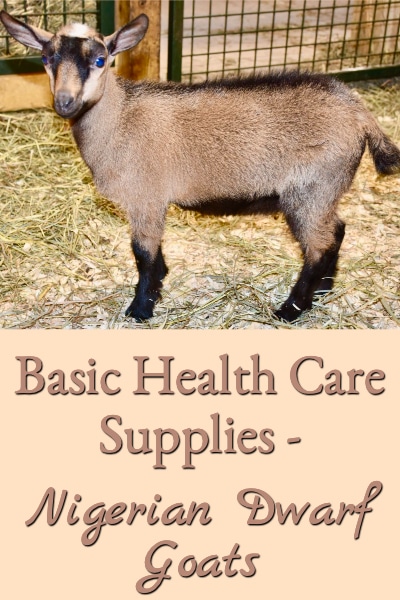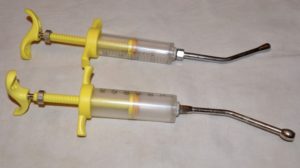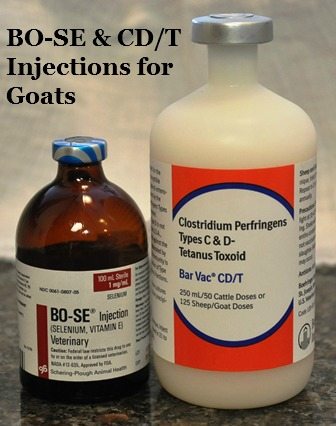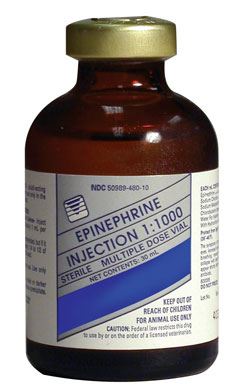
The list below is not a comprehensive list of health care supplies to have on hand to deal with any health issue, but it’s a start on those that deal with the most common ailments you might encounter.
It does not include the basics to have on hand for pregnant does, freshening does, and newborn kids (see Goat Kidding Supplies for more on these supplies).
If there is a milk withdrawal time associated with the product, I have included it in the information below. These items are currently available over-the-counter unless specifically identified as an Rx drug.
Basic Health Care Supplies
Health Supplies
- Rectal Thermometer – This is really a must, because one of the easiest ways to tell if a goat is sick is to take its temperature. Digital rectal thermometers are inexpensive and quick, which makes them your best bet when trying to get the temperature of a wiggly goat.
- Syringes – Luer lock 3 ml and 6 ml syringes. These syringe sizes are appropriate for dosages sized for the smaller Nigerian Dwarf goats.
- Needles – 20 and 22 gauge needles in 3/4″ to 1″ lengths usually handle any shots that they need.
- Drencher – A 20 or 30 ml drencher is indispensable for administering drugs and dewormers orally to goats.

Drenchers
Health Care Products
- Activated Charcoal – This is used to absorb toxins when a goat has consumed something poisonous. Hopefully, it’s something that you’ll never need, but if you do, it’s probably too late if you don’t already have it on hand. Available from caprine or livestock supply sources and dosages vary depending on the brand, so follow your veterinarian’s instructions or those on the label.

Activated Charcoal Paste
- Baby Aspirin – Give baby aspirin to a goat to relieve pain (when goats are in pain they grind their teeth), lower a high fever, or reduce inflammation. The dosage is one baby aspirin for every ten pounds of weight and it can be given every four hours. This is the same over-the-counter 81 mg baby aspirin that you buy at the pharmacy. To administer, dissolve in hot water and give orally (a little added molasses might make the goat accept the treatment better). Make sure to use real aspirin, Ibuprofen, or Tylenol should not be used for goats. There is no milk withdrawal time.
- Blood stop powder – This is a styptic powder used to stop the bleeding when a goat’s hooves have been trimmed too aggressively or it’s suffering from other injuries.
- Electrolyte Mix – These powdered products are used to re-hydrate sick goats. They can be mixed with water and used as an oral drench or can be mixed into the drinking water. There is no milk withdrawal time.
- Milk of Magnesia – This is a laxative used to relieve constipation, a toxic reaction, or other indigestion from overeating or improper feeding. The dosage is 15 ml orally for every 60 pounds body weight every four to six hours as needed. It’s important to make sure the goat stays well-hydrated when taking a laxative. Five days milk withdrawal time.
- Nutra Drench – A supplement that supplies quick energy to stressed goats. It contains the vitamins, minerals, and nutrients to help a sick goat recover from illness.
- Probios or Probiotics – These are two name brand products that reintroduce beneficial organisms to the stomach, aid digestion, and help maintain proper Ph. It’s highly recommended that the product be used during and after any antibiotic treatment (the antibiotics kill the beneficial micro-organisms in the rumen), after treatment for diarrhea, and in any situation which causes the goat(s) stress. The recommended dosage is ten grams for adults and five grams for kids, four times daily for three to five days. These products are in a paste form that can be administered by smearing the paste on the roof of the goats’ mouth. There is no milk withdrawal time.

Probios
- Vegetable Oil/Corn Oil – This is used to get things moving if a goat has gotten into the grain and gorged, hopefully before the rumen becomes impacted. It can also be used to help if a goat is constipated. This is the typical cooking oil that you get from the grocery store, and probably already have in your pantry. Mineral oil is not a suitable substitute for these oils because it has no taste and goats may aspirate it into their lungs.
- Vitamin B Complex – This complex available from caprine or livestock supply sources and will stimulate the appetite in goats that are not eating. Dosage is 2 ml subcutaneously and there is no milk withdrawal time.
Vaccinations/Dewormers/Supplements/Etc.
- Antibiotics – It’s a good idea to have a couple of different antibiotics on hand, they are used for a variety of conditions. Two that are often recommended are Procaine Penicillin (Penicillin G) and Biomycin 200 (Oxytetracycline). Beginning in 2017, most antibiotics will be available only as Rx drugs.
- Pen G – The dosage is 1 ml per 25 pounds administered subcutaneously or intramuscular. It should be refrigerated and it has a 72-hour milk withdrawal time.
- Biomycin 200 – This version of oxytetracycline doesn’t sting as much as others (LA-200, etc.). The dosage is 1 ml per 25 pounds administered SQ or IM every other day for a maximum of three times. This also has a 72-hour milk withdrawal time.
- Spectrum Scour Halt – An antibiotic used to control diarrhea (not caused by coccidia) in goat kids. It should not be used for adult goats. Administer orally at the dosage identified on the label.
- Toltrazuril – This is used to treat coccidiosis and is available from this source: https://horseprerace.com/toltrazuril-5-200ml-baycox/. It is a one-time treatment and the dosage is 1 ml per five pounds weight. It should be refrigerated and is invaluable to have on hand when there is a coccidia outbreak.
- BoSe – Many areas of the United States are considered selenium deficient, and this Rx prescription drug is given to goats living in such areas to prevent problems caused by selenium deficiency. The dosage is 1 ml per 40 pounds.

BoSe & CD/T
- C/D&T Toxoid (Clostridium Prefringes Type C & D and Tetanus) – This provides yearlong protection from overeating disease (types C & D) and tetanus. The dosage is 2 ml administered SQ. Young goat kids should receive the vaccination at two to three weeks of age and then again four weeks later. All goats should then be given a shot annually. The toxoid should be kept refrigerated and there is no milk withdrawal time.
- C&D Antitoxin – This is given to try to save a goat that has developed enterotoxemia (overeating disease). The dosage is 5 ml (for kids) and up to 40 ml (for adults) administered SQ. It should be refrigerated. It’s best to try to prevent the disease by giving an annual C/D & T shot annually, but it’s critical to have this on hand if a goat develops the disease – there’s not likely to be time to go purchase it. Five days after using this, the goat must receive the C/D&T Toxoid and then again in 30 days to provide long-term protection.
- Epinephrine – This is an Rx prescription drug that every goat owner that gives injections should have on hand. When given an injection, a goat can go into anaphylactic shock, and the only way to save it is to administer this. Always have it on hand and ready to use when giving injections, you won’t have time to go get it if a goat goes into shock. The dosage is 1 ml subcutaneously per 100 pounds. This is one of the few drugs that really does become ineffective after the expiration date, so make sure to always have a fresh bottle on hand and throw out any that has expired. It should be refrigerated and there is no milk withdrawal time.

Epinephrine
- Tetanus Antitoxin – This is used for the immediate treatment of tetanus. Tetanus is fatal if not promptly treated so it’s best to have on hand. It’s available in a single-dose five ml vial that should be refrigerated. The entire five ml should be administered IM for adults and half that for kids. Five days after this is used, the goat must be re-vaccinated with tetanus toxoid or the C/D&T toxoid (the two-injection series given 30 days apart) to prevent the disease for the next year.
- Dewormers – Some dewormers are no longer effective in some parts of the country, and most dewormers will not treat all of the possible internal parasites of goats, so it’s a good idea to have several on hand. All dewormers are best given to goats orally as a drench when treating internal parasites. Three that are commonly used are Ivomec 1% Injectable, Valbazen, and Cydectin. Deworming is most effective when repeated in 10 – 14 days to catch any larvae that hatch out after the first treatment.
- Ivomec 1% Injectable – The dosage for this popular dewormer is 1 ml per 50 pounds. This is the preferred dewormer when treating for Meningeal Deerworm infection but is not effective against tapeworms. Nine days milk withdrawal time.
- Valbazen – The dosage for this dewormer is 1 ml per 25 pounds and it is effective against both tapeworms and lungworms. However, it can cause abortions or birth defects, so never use it on a pregnant doe. Seven days milk withdrawal time.
- Cydectin – Dosage for this dewormer is 1 ml per 22 pounds and it is one of the most effective dewormers. It should be used sparingly so the worms do not become immune to it. This can also be used topically for lice and external parasites. For topical use, distribute one – three ml along the spine from the base of the neck to the tail. 14 days milk withdrawal time, and some sources specify that this should not be used for lactating goats.
- Copper Bolus – Copper deficiency is a documented problem for goats in many areas of the United States and other countries. Copper boluses were developed to treat copper deficiency and are available in 2 and 4-gram bolus sizes for goats. The dose for copper bolusing is 1 gram of copper oxide in the bolus form per 22 pounds of goat weight.
This list covers most of the health care supplies to have on hand, but there are many more that you’ll likely add as time goes on. Did I miss any health care supplies that you consider critical for starting out with Nigerian Dwarf goats?
Amy says
Hi- my Nigerian boy are almost 7 months old. They were supposedly vaccinated at 8 weeks and 16 weeks and also dewormed the day before I brought them home. These boys are my first experience with goats. They have been dehorned and banded before I bought them as well. I have been reading and learning about them for months now. I’m having a problem getting a solid answer on a deworming and vaccine schedule. Can you please give me an idea of a schedule that you would personally have yours on for the year so I can make sure my boys stay healthy. I would like to know what meds you use and if you rotate. I checked the lower eyelid and it’s a light shade of pink in both boys. I’m sorry for all the questions however everyone has so many different ideas and methods. Any of your knowledge would be greatly appreciated!
Lesa says
Hi Amy, Congratulations on your boys! Your question is not an easy one to answer as it’s difficult to define a schedule because there are so many variables. But I can try. The things you’ll likely need to give them are a CD/T shot, BoSe shot, Copper Bolus, and Dewormer. Whether you need all of the last three and how much of each depend on where you live.
For the CD/T & BoSe, there is a post on that here: https://www.betterhensandgardens.com/annual-cdt-bose-injections-for-goats/ Your goats should get the CD/T shot annually and get BoSe if you live in a selenium deficient area. How often to give BoSe depends on how selenium deficient your location is. We usually do it 3 to 4 times yearly.
For copper bolusing, again it depends on your location. We’ve found copper deficiency can by a big problem and bolus the intact males 3 to 4 times yearly. We don’t keep wethers so I don’t know if they need it as frequently. There’s a post on copper bolusing here: https://www.betterhensandgardens.com/copper-bolusing-goats-prevent-copper-deficiencies
Finally, as far as dewormers and internal parasites, I wrote a rather lengthy post on that, it’s here: https://www.betterhensandgardens.com/identify-control-goat-internal-parasites/ It would be helpful to know where you live, it will likely make a difference in how often you have to deworm and what dewormers will work for you. Our farm is in the Northeast and I’m careful not to underdose or deworm too frequently so all the dewormers I listed above work on our property. I only deworm when it looked like their eye membranes are looking light or there is some other indication of worms (no set schedule) for the boys. I rotate between Ivomectin and Valbazen, saving Cydectin for if something really serious were to pop up.
LuettA says
Lesa, could you tell me how much alfalfa pellets, goat feed pellets should I feed my pregnant Nigerian goats? They get forage and hay , goat minerals and baking soda also . I was told to only feed them a hand full of pellets a day.
Lesa says
Hi Luetta, that’s a big question and I wrote a lengthy blog post about it. In general, I’d say that only a handful might not be enough, but it depends on each goat and if you’re trying to maximize milk production. Try reading the post and see if that doesn’t help: https://www.betterhensandgardens.com/feeding-nigerian-dwarf-dairy-goats/
CHRIS SPAGNA says
i have 2 preganant goats. do I need to give them any supplements to insure healthy babies and mommas
Lesa says
Hi Chris, we usually do a CD/T and BoSe about a month before they are due, and de-worm about a week before they are due. You could read more about it in the goat kidding archive on this site here: http://www.betterhensandgardens.com/category/goat-2/doe-kidding-care/
Jamie says
I am getting 2 ND doelings, about 1 month old. Should I get all of the items listed above before I pick them up?
Lesa says
Hi Jamie, yes you should probably have most of the items listed above on hand, if you are going to keep goats, you will probably need them at some point, and the goats usually decide to get sick when stores are closed. You won’t need all the dewormers at first, but you should definitely have one on hand and treatment for coccidia. One of the antibiotics, penicillin or Bio-mycin should be enough to get started too – I guess I’d go with Bio-mycin for the youngsters.
Jamie says
Thank you so much!! For Coccidia, you recommend Toltrazuril 5% – 200mL Baycox? Or is there something I could get at Tractor Supply or Atwoods that you would recommend?
Lesa says
I don’t know of anything that is as effective as the Toltrazuril or as easy to use. But you can’t get it at TSC, etc. you need to order it online.
Tessa says
Where would I get Epinephrine? I get CD/T shots at Tractor Supply, the orange bottle with the goat on it, and it leaves no vaccine lump. we used it 6 times, with no lumps at all. How long can I keep things like this? Do they need to be used within a certain period?
Lesa says
Hi Tessa, Epinephrine is a prescription drug, so you will need a veterinarian to prescribe it for you. The veterinarian may be able to also fill the prescription or may send it to an animal supply store to fill the prescription. Both epinephrine and CD/T have (and most other drugs) have expiration dates listed on the bottles after which they should be replaced with new bottles. Epinephrine in particular is NOT good after the expiration date so you need to be careful to keep a fresh supply on hand. A small bottle is pretty inexpensive and I’m always happy when I have to throw out an expired bottle – without having to have used any!